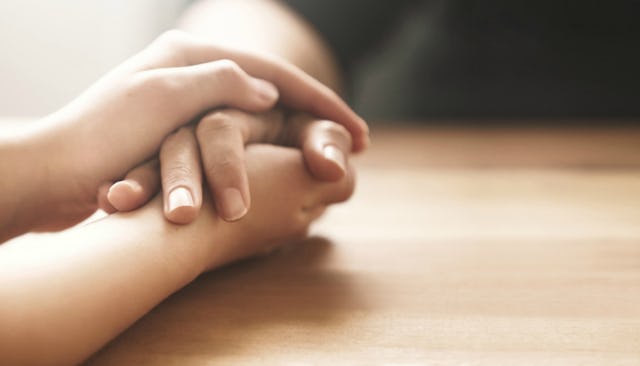I Know What's Coming For My Friend, And It Sucks

When my dad was diagnosed with stage IV esophageal cancer in 2012, it blindsided me. I spent hours on the phone with him and with his doctors trying to get a handle on what was going to happen in the coming months. I cried, I stress binged on ice cream, and I treated my husband badly, because I was so scared. My laundry went unfolded, the dust on my coffee tables was an inch thick, and I could barely remember to wash my hair. With every passing day, there was another huge new piece of information to process: chemotherapy regimens, drug protocols, and medical complications.
My life was in shambles, and I would lie awake at night, a scared daughter terrified of losing her father, crying because my nursing training couldn’t save the one person I wanted to save most. I felt helpless and angry on the good days, vengeful and bitter on the bad days. Cancer destroyed any normalcy I felt as a mother, wife, and daughter.
And I was pissed.
I was a mess, and I needed all the help I could get from those around me. I turned to my friends for solace and help with processing my feelings, and they rallied around me.
I had friends who ran next to me when I needed to angry-run at my “I Hate Cancer” pace, friends who would let me call from the aisles of the grocery store when I couldn’t handle hearing one more word about lab values and hospice care. And my best friend—my husband—would hold me as I angrily cried hot tears of frustration, and he kept his mouth mercifully quiet when dinner was macaroni and cheese from a box three nights running. I lashed out at those closest to me, and to their credit, they loved me through it.
And when my dad died in October 2012, in my darkest days, my friends showed me kindnesses I never thought possible. On the day of my father’s funeral, a friend sent my family a catered breakfast from six states away because she knew none of us would remember to eat before we left. In those moments, when the grace of my friendships was so apparent, I promised myself I’d pay it forward. I vowed that I’d be the friend I was given when I needed help the most.
It’s been four years since my dad passed away, and I’ve lost count of how many friends of mine have lost parents since then. I’ve stood with them at funerals, brought them food that is not Italian based (seriously, we got nine lasagnas after my dad died. Bring fried chicken, people), and sent them gifts that commemorate their loved one rather than flowers that die a few days later. I’ve become a better friend in a crisis and that is the one bright spot in losing my father.
Though I’ve become adept at the tangible help in a crisis, what hasn’t gotten easier is that moment when a friend tells me their parent has been handed a devastating cancer diagnosis. That moment when my friend looks at me, and I can see the same anguish I felt in those early days after my dad’s death sentence was handed down by a doctor with kindly eyes.
I know what’s coming for my friend, and it sucks. I want to shelter her from the inevitable pain of seeing her mother take her last breath. I want to tell her to buy the ugly funeral dress she’ll never wear again now so that she doesn’t have to wander Target aimlessly the night before the funeral. I want to tell her to memorize her mother’s hands because she’ll likely forget what they look like and that’s strangely disconcerting. I want to tell her that she’ll have irrational thoughts about her mother being cold in the ground or visions of her mother in the grocery store that are so real she’ll want to vomit in the cereal aisle.
I want her to know that she’ll drink too much in the months after her mother’s death, and she will want to junk punch idiots who say “time heals all wounds.” I want her to know she’ll never be able to sit in church without the memories of the casket in the aisle and that the choir always seems to play “Amazing Grace” on the days you miss her the most. I want to tell her that laughing becomes a chore in those first few months and that funeral homes charge for everything, right down to the little prayer cards.
But, I won’t tell her those things. Not yet. Because she’ll find them out on her own, in her own time, on her own journey. For now, I will quietly listen to her anguish, lift her up on her bad days, and pour copious amounts of wine when she needs to disconnect from it all. And I will remind her that I’m living proof that she can survive losing a parent and that laughter will find its way back to her lips, in time.
And in the end, I’ll be there to hold her hand when she joins the I’ve Lost A Parent Club—the one she doesn’t yet know exists.
This article was originally published on